(3) Assistance for Stability and Security
Through globalization as well as the advancement and spread of high-tech devices, transnational organized crime and acts of terrorism have become a threat to the entire global community. In recent years, transnational organized crime, including the illicit trafficking of drugs and firearms, trafficking in persons (forced labor and sexual services, etc.) Note 19 , cybercrime, and money laundering Note 20, has become increasingly diversified and sophisticated in its methods. Moreover, acts of terrorism by local groups that are affiliated with and influenced by the Islamic State of Iraq and the Levant (ISIL) and other international terrorist organizations, as well as homegrown terrorism Note 21 by individuals influenced by violent extremism, also pose a grave threat. In addition, piracy and armed robbery against ships off the coast of Somalia and in the Gulf of Aden in eastern Africa, the Gulf of Guinea in western Africa, and in the waters of Southeast Asia, are still a concern.
There are limitations for any one nation to effectively deal with transnational organized crime, acts of terrorism, and piracy. Therefore, not only must each nation strengthen its countermeasures, the entire international community must also work together to eliminate legal loopholes through assistance to build capacity in the fields of justice and law enforcement in developing countries.
●Japan’s Efforts
A. Enhancing the Capabilities of Security Authorities
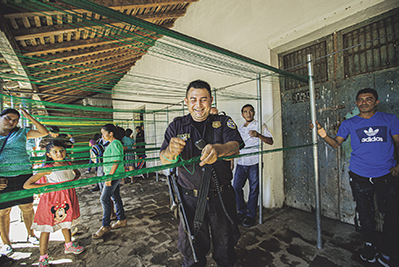
A police officer in El Salvador promoting safe community building by teaching local residents hammock building techniques and supporting their self-reliance through the technical cooperation “Project for the Consolidation of the Implementation of the New Police Model Based on the Philosophy of Community Police.” The project was implemented via triangular cooperation involving JICA and Brazil. (Photo: MATSUKI Yuichi/JICA) (See Glossary regarding triangular cooperation.)
In the area of capacity building of police agencies that constitute a cornerstone in maintaining domestic security, Japan provides assistance focused on the transfer of knowledge and skills based on the track records and experiences of the Japanese police in international cooperation, while emphasizing human resources development, including enhancement of administrative capabilities and systems.
For example, the National Police Agency (NPA) of Japan is dispatching experts and accepting trainees from mainly Asian countries such as Indonesia and sharing how Japan’s police are trusted by its people as a democratically controlled police.
B. Counter-Terrorism
In 2020, international counter-terrorism measures also entered into a new age due to the spread of COVID-19. The effects of the pandemic rippled not only through domestic politics, economies, and societies, but all the way through international political and economic order as well as peoples’ behaviors, consciousness, and sense of values, greatly changing the environment surrounding terrorism. Terrorists continue their activities across each region, including Asia, adapting to the new social situations impacted by the pandemic, including social divisions caused by weakened governance, poverty, and the manifestation of racial and ethnic issues. Moreover, due to people’s increased dependence on information and communication technologies worldwide, there is an urgent need for comprehensive response to the spread of extremist beliefs through the internet and social media and illegal acts in cyberspace that lead to terrorism, such as terrorist financing.
Furthermore, with regard to the issue of foreign terrorist fighters (FTF) returning to their home countries or relocating to other countries, following ISIL’s loss of territory in Iraq and Syria in 2019, it has become extremely important to adopt measures that include the extradition of the former combatants and their families, appropriate prosecution, deradicalization, rehabilitation, and social reintegration, as well as to conduct grassroots-level enlightenment activities and strengthen communities so that women and youth in particular are not influenced by violent extremism. In addition, there is a need to rapidly respond to imminent issues including the strengthening of maritime security, prevention of violent extremism in prisons, and the treatment of prisoners, as well as the impact of COVID-19 on environments surrounding terrorism in 2020, and as such Japan is conducting various projects through international organizations.
In FY2019, Japan contributed a total of $2.4 million to community support projects for the empowerment of women and youth implemented by UNDP and UN Women, $210,000 to a project in Senegal’s border regions aimed at peacebuilding through the promotion of community-level dialogue and the training of women and youth peace mediators implemented by UN Women, and approximately $1.4 million to a project implemented by the United Nations Office on Drugs and Crime (UNODC) to enhance the capacity of staff working in prisons to prevent extremism within prisons and introduce classification techniques based on the risk analysis of inmates.
C. Measures against Transnational Organized Crime
As globalization advances, the threat of transnational organized crime that is conducted on a large scale and systematically across different countries is becoming more serious. Japan, as a state party to the United Nations Convention against Transnational Organized Crime (UNTOC), a legal framework for preventing transnational organized crime including terrorism, is promoting international cooperation that includes mutual legal assistance based on the Convention. Additionally, Japan mainly provides the following international cooperation.
... Measures against Drug Trafficking
Alongside its active participation in international conferences such as the United Nations Commission on Narcotic Drugs (CND), Japan supports counter-narcotics efforts through financial contributions to the UNODC. Specifically, Japan is making efforts to prevent illicit drug trafficking through support for strengthening enforcement capacity in Afghanistan and the neighboring regions, where the narcotics problem is particularly serious, as well as border-control assistance mainly in the Asia region.
In addition, the NPA of Japan holds discussions in related countries mainly from the Asia-Pacific region about the narcotics situation in each country, investigation methods, and international cooperation in the field, aimed at establishing a framework for mutual cooperation.
... Measures against Trafficking in Persons
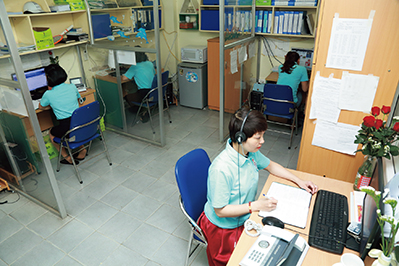
The Hotline 111 Hanoi Operation Center, supported by the technical cooperation “Project for Strengthening the Operation of Hotline for Counseling and Supporting Trafficked Survivors” in Viet Nam (Photo: JICA/Viet Nam Ministry of Labour, War Invalids and Social Affairs, Department of Child Affairs)
Japan is a state party to the Protocol to Prevent, Suppress and Punish Trafficking in Persons Especially Women and Children, a comprehensive international agreement concerning trafficking in persons (forced labor and sexual services, etc.). Based on the “2014 Action Plan to Combat Trafficking in Persons” drawn up in 2014, Japan is engaged in various efforts to eradicate trafficking in persons, which is a serious violation of human rights and an extremely malicious crime. Under this Action Plan, the Government of Japan has been publishing annual reports on its efforts to combat trafficking in persons since 2014, while also strengthening cooperation with various ministries, agencies, relevant organizations, and NGOs.
With regard to victims of trafficking in persons protected in Japan, Japan assists in the safe repatriation of them, as well as provides support for the independence and social rehabilitation of these individuals through means such as education and vocational training through contributions to the International Organization for Migration (IOM). Additionally, through its financial contributions to the projects of UN organizations such as UNODC and UN Women, and JICA’s technical cooperation, Japan also contributes to taking measures against trafficking in persons and efforts to protect victims mainly in Southeast Asia. Japan also financially contributes to and participates in the Bali Process, which is an Asia-Pacific regional framework against smuggling and trafficking in persons, and transnational crime.
... Measures against Money Laundering
There is a high risk for the profits of transnational organized crime to be used to fund further organized crime or acts of terrorism, and thus, eliminating such flows of illicit funds is an important task for the international community. Therefore, Japan actively participates in discussions on international measures against money laundering and terrorist financing through intergovernmental frameworks such as the Financial Action Task Force (FATF) established based on the Economic Declaration of the Arch Summit in 1989. Japan also cooperates with UNODC to provide capacity building assistance, including legal technical assistance, to counter terrorist financing mainly in South Asia, including Bangladesh, the Maldives and Pakistan.
D. Capacity Building for Maritime, Outer Space, and Cyberspace Issues
... The Seas
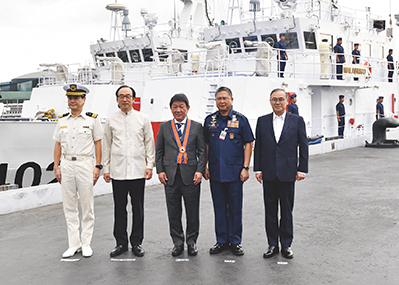
Foreign Minister Motegi visiting the “Malabrigo,” a patrol vessel in the Philippines that the Japanese government assisted in the construction of through an ODA loan (January 2020)
As a maritime nation, Japan depends largely on maritime transport for the import of much of its energy resources and food, therefore ensuring marine traffic safety, such as by addressing maritime threats, is an issue that directly links to Japan’s existence and prosperity as a nation. Moreover, an open and free international order of the seas based on the rule of law is extremely important for realization of a “Free and Open Indo-Pacific (FOIP)” promoted by Japan for not only Japan’s economic development but also that of the region.
In order to establish and promote the rule of law at sea, Japan is utilizing tools such as ODA to seamlessly support the improvement of law enforcement capacity of maritime security agencies in the Indo-Pacific region through the provision of patrol vessels, technical cooperation, and human resources development, while promoting international cooperation for capacity building in Maritime Domain Awareness (MDA) among recipient countries. Specifically, Japan is carrying out human resources development through training and the dispatch of experts for maritime countries along sea lanes including Indonesia and Malaysia, in addition to providing vessels and maritime security-related equipment to Viet Nam, the Philippines, and other countries. Moreover, at the 12th Mekong-Japan Summit held in November 2020, Prime Minister Suga announced that Japan would provide an information-gathering web portal as well as human resources development for MDA capacity building in the Mekong countries as one of the “Five Points of Cooperation” (see “ODA Topics” regarding efforts to realize the Free and Open Indo-Pacific).
In addition, in order to promote regional cooperation in countering piracy and armed robbery against ships in the Asia region, Japan led the formulation of the Regional Cooperation Agreement on Combating Piracy and Armed Robbery against Ships in Asia (ReCAAP). Each contracting party is advancing cooperation and information sharing related to piracy and armed robbery against ships via the Information Sharing Centre (ReCAAP-ISC) established in Singapore based on the agreement, and Japan supports ReCAAP-ISC’s activities through the dispatch of an Executive Director and Assistant Director and financial contributions. Japan has also led co-organizing trainings together with ReCAAP-ISC since 2017 aimed at capacity building related to antipiracy measures for the maritime law enforcement agencies of contracting parties, among others.
In order to counter the threat of piracy off the coast of Somalia and in the Gulf of Aden in Eastern Africa, Japan has been conducting anti-piracy operations since 2009. Moreover, Japan has contributed a total of $15.53 million to the IMO Djibouti Code of Conduct Trust Fund, which was founded by the International Maritime Organization (IMO) to implement the Djibouti Code of Conduct Note 22. This Trust Fund has been used to establish information-sharing centers for anti-piracy measures and the Djibouti Regional Training Centre, which conducts training programs to improve maritime security capabilities in countries surrounding Somalia. Japan has also contributed a total of $4.5 million to the International Trust Fund Note 23 to support Somalia and its neighboring countries in improving their capabilities in arresting and prosecuting alleged pirates in order to assist the international community in its measures to prosecute pirates, strengthen enforcement, and prevent the recurrence of piracy. Also, in cooperation with the Japan Coast Guard, maritime law enforcement training courses have been carried out with the participation of maritime security officers from the countries surrounding Somalia. Furthermore, with the understanding that the reconstruction and stability of Somalia are essential for a fundamental solution to the piracy issue in the area, since 2007, Japan has disbursed approximately $500 million for the restoration of basic social services, improvement of policing capability, and revitalization of domestic industries in Somalia.
Oil spillage from ships that occur on sea lanes not only have an impact on the safe navigation of ships passing through, but can also cause fatal damage to the fishery and tourism industries of coastal countries by polluting the coast. Hence, it is important to strengthen the capacity for dealing with such oil spill incidents. To that end, Japan dispatches experts (advisors for improving oil spill management capabilities) to Sri Lanka, which is positioned on sea lanes that connect Asia with the Middle East and Africa, to support the strengthening of its capability to manage oil spills at sea. Furthermore, in response to the oil spill from a bulk carrier off the coast of Mauritius, Japan dispatched Japan Disaster Relief (JDR) teams three times consecutively at the request of the Mauritian government. The teams conducted surveys on the spillage situation, worked on removing the oil, and also supported activities related to the fields of environment in cooperation with the local government and related countries and institutions. Moreover, Japan provided the Mauritian government with oil removal materials and equipment to be used locally (see also Project Introduction Column for details).
Furthermore, the International Hydrographic Organization (IHO) has been conducting a training program in the United Kingdom every year since 2009 with the aim of nurturing nautical chart experts in developing countries. This program is carried out with grant assistance from The Nippon Foundation and the participation of the Hydrographic and Oceanographic Department of the Japan Coast Guard in the management of the program. Since its launch, the project has produced 72 graduates from 41 countries. The IHO and Intergovernmental Oceanographic Commission (UNESCO-IOC) are engaged in a joint project to create the General Bathymetric Chart of Oceans (GEBCO), a topographical map of the world’s seafloor. The map has been under revision through the cooperation of experts around the world, including the Hydrographic and Oceanographic Department of the Japan Coast Guard. Also, through grant assistance offered by The Nippon Foundation, a human resource training program aimed at fostering personnel who can contribute to the GEBCO project has been conducted at the University of New Hampshire in the United States every year since 2004. To date, this program has produced 96 graduates from 43 countries.
... Outer Space
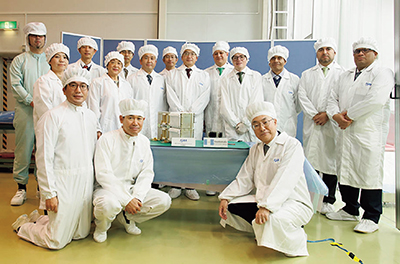
A commemorative photo of the Universidad del Valle satellite development team and related JAXA personnel prior to launching Guatemala’s first extremely small satellite (Photo: JAXA)
Japan contributes to addressing global issues including climate change, disaster risk reduction, marine/fisheries resource management, forest conservation, and resources/energy through the implementation of development cooperation and capacity building assistance utilizing space technology. Japan has also proactively provided assistance in the field of human resources development for emerging countries and developing countries in their efforts toward the development and utilization of outer space. In particular, initiatives by Japan, such as providing opportunities for space experiments and the development of small satellites that make use of the International Space Station (ISS) /Japanese Experiment Module “Kibo,” have been highly acclaimed in the international community. In April 2020, Guatemala’s first CubeSat was deployed through the “KiboCUBE” program, a cooperative framework between the UN Office for Outer Space Affairs (UNOOSA) and the Japan Aerospace Exploration Agency (JAXA) that provides developing countries with the opportunity to deploy CubeSats from “Kibo.” A congratulatory video message sent by the president of Guatemala showed heightened expectations for Japan’s space cooperation in the country. In addition, the Kibo Robot Programming Challenge (Kibo-RPC) was held from June to October, a competition in which students develop programs to operate ISS drones and clear assigned tasks within the “Kibo” module, competing on the time and problem-solving ability, with 1,168 students across 313 teams participating from Japan and seven Asia-Pacific countries and regions.
In addition to these initiatives, in 2016, Japan formulated basic policies to strategically and effectively offer all-Japan support for capacity building in the field of outer space in developing countries and is providing active support. For example, in Mozambique and the Democratic Republic of the Congo, Japan is conducting forest monitoring utilizing a tropical forest monitoring system (JICA-JAXA Forest Early Warning System in the Tropics: JJ-FAST) that uses satellite data from “Daichi-2.”
... Cyberspace
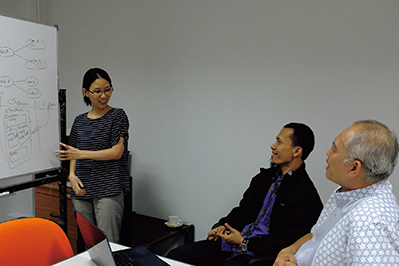
Discussions on curriculum development being held through the “Project for Human Resources Development for Cyber Security Professionals” in Indonesia (Photo: JICA)
In recent years, it has become a pressing task to take measures against threats to a free, fair, and secure cyberspace, and in order to respond to these issues, it is thus necessary for diverse actors in each country to work together. However, the lack of security-related awareness and response capacity in some countries, including developing countries, poses a significant risk to the entire world, including Japan. Furthermore, Japanese people traveling overseas and Japanese companies expanding their business to foreign markets depend on the social infrastructure and cyberspace managed and operated by the host countries. Therefore, strengthening cooperation for ensuring the security of cyberspace in countries around the world and providing capacity building support to developing countries not only contribute to the recipient countries, but also benefit Japan and the entire world.
Japan participates in the ASEAN-Japan Cybercrime Dialogue held based on the commitment made at the ASEAN-Japan Commemorative Summit in December 2013. The 3rd ASEAN-Japan Cybercrime Dialogue was held in Brunei in January 2019, and Japan introduced its initiatives regarding cybercrime countermeasures. Japan also provides contributions to cybersecurity-related capacity building projects in Asian countries implemented by international organizations.
In addition, Japan has held the Japan-ASEAN Information Security Policy Meeting since 2009 and carried out cooperation toward strengthening mutual understanding and cooperation on cybersecurity policies as well as resolving common issues through the Japan-ASEAN framework. Under this framework, cyber exercises and tabletop exercises have been held with ASEAN member states since FY2013.
Furthermore, Japan has provided assistance through the Japan-ASEAN Integration Fund (JAIF), which consists of financial contributions from the Government of Japan, to establish the ASEAN-Japan Cybersecurity Capacity Building Centre in Bangkok, Thailand, as well as to provide the Cyber Defense Exercise with Recurrence (CYDER), a practical exercise targeted at cybersecurity personnel of government agencies and critical infrastructure operators in ASEAN countries. Through these efforts, Japan promotes cooperation in capacity building in the area of cybersecurity in ASEAN. In 2020, as the first project based on the Japan-ASEAN Technical Cooperation Agreement, cyber security training for related personnel from ASEAN member states and the ASEAN Secretariat was implemented from January through February 2020 (see Project Introduction Column for details).
Moreover, since 2017, Japan has been conducting training for staff engaged in combatting cybercrimes at the People’s Public Security of Viet Nam, with the aim of helping them acquire the knowledge and skills for dealing with cybercrimes, as well as strengthening cooperative relations between the security agencies of Japan and Viet Nam.
Furthermore, since FY2018, experts from the Governments of Japan and the United States as well as private companies have been cooperating to implement exercises every fiscal year concerning cybersecurity for industrial control systems in important infrastructure fields such as electricity and gas, targeting the Indo-Pacific region.
ASEAN
Capacity Building in Policy Formation for Enhancement of Measures
to Ensure Cybersecurity in ASEAN Region
Technical Cooperation (Knowledge Co-Creation Program) (January 26 – February 7, 2020)
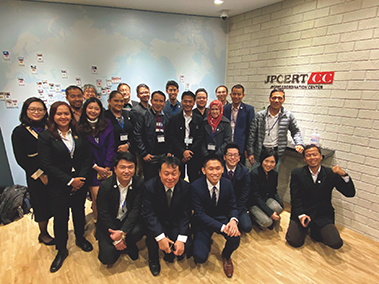
The training program (Photo: JICA)
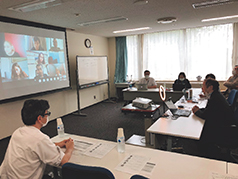
The online seminar (Photo: JICA)
The Association of Southeast Asian Nations (ASEAN)*1, which has been undergoing remarkable economic growth in recent years, has been promoting regional integration since the establishment of the ASEAN Community at the end of 2015. However, this has also brought to light some challenges. To further bolster the ASEAN integration process, in May 2019, Japan created a mechanism for human resources development across the entire ASEAN region by signing the Japan-ASEAN Technical Cooperation Agreement to provide technical cooperation to ASEAN as a community, in addition to Technical Cooperation Agreements with individual ASEAN member states.
In January 2020, as the first project under the Agreement, training was conducted in Japan to build up capacity to formulate policy to enhance cybersecurity measures in the ASEAN region. A total of 17 officials in charge of cybersecurity policymaking, including officials from ODA graduate countries*2 such as Singapore and Brunei participated in this training, with the attendance of officials of the ASEAN Secretariat and ASEAN-Japan Cybersecurity Capacity Building Centre (AJCCBC)*3 for the first time.
In order to promote the planning and implementation of appropriate cybersecurity policies in ASEAN countries, this training provided an opportunity to learn about Japan’s cybersecurity initiatives and information security management in government agencies through lectures and visits to related facilities in Japan. In addition, the participants exchanged information and opinions on the situation in each ASEAN country through active discussions.
Furthermore, as a new attempt for the training program during the COVID-19 pandemic, an online seminar was held in September 2020 for the participants in the training program in Japan. Eleven out of the 17 participants attended the seminar, during which they shared the current situation in their respective countries and engaged in active discussions on topics including the impact of the spread of COVID-19 on cybersecurity.
Through implementing such training programs, Japan will contribute to the regional integration of the ASEAN, and implement beneficial cooperation for both Japan and ASEAN to promote the realization of the “ASEAN Outlook on the Indo-Pacific (AOIP),” which shares fundamental principles with the “Free and Open Indo-Pacific (FOIP)” advocated by Japan.
*1 See Note 1 for the ASEAN member states.
*2 Countries that are no longer listed in Annex 1 to the ODA Reporting Directives, that defines ODA recipient countries, due to higher income levels, and have thus “graduated” from ODA recipient countries.
*3 See Cyberspace for details.
- Note 19: The act of recruitment, transportation, transfer, harboring, or receipt of persons for the purpose of exploitation, such as forced labor or prostitution (Article 3 of the Protocol to Prevent, Suppress and Punish Trafficking in Persons Especially Women and Children).
- Note 20: The act of disguising criminal proceeds as legally obtained assets, or the act of hiding such funds. One example is the act in which a drug dealer hides money gained through drug trafficking in a bank account opened under a false name.
- Note 21: Acts of terrorism by those who have grown natively in the country.
- Note 22: A regional cooperation framework for Somalia and its neighboring countries.
- Note 23: From December 2012, the Multi-Partner Trust Fund Office (MPTF Office) took over the management of funds from UNODC.
